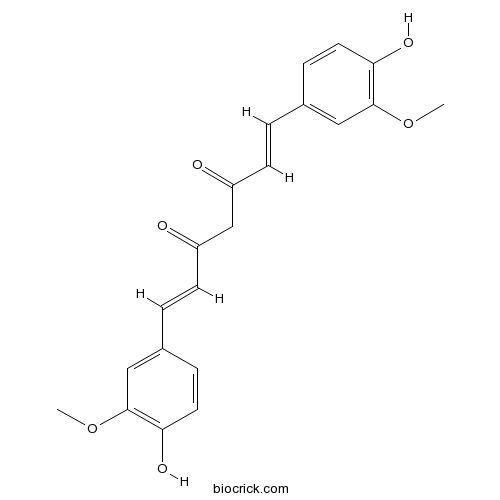InChI=1S/C21H20O6/c1-26-20-11-14(5-9-18(20)24)3-7-16(22)13-17(23)8-4-15-6-10-19(25)21(12-15)27-2/h3-12,24-25H,13H2,1-2H3/b7-3+,8-4+
Curcumin, a polyphenolic compound derived from dietary spice turmeric, possesses diverse pharmacologic effects including anti-inflammatory, antioxidant, antiproliferative and antiangiogenic activities, it has effective activity against including cancer, cardio-
vascular diseases, diabetes, arthritis, neurological diseases and Crohn's disease; it is safe even at high doses (12 g/day) in humans but exhibits poor bioavailability, to improve its bioavailability , numerous approaches have been undertaken, such as, first, the use of adjuvant like piperine that interferes with glucuronidation; second, the use of liposomal curcumin; third, curcumin nanoparticles; fourth, the use of curcumin phospholipid complex; and fifth, the use of structural analogues of curcumin (e.g., EF-24). [1,2]
Curcumin is reported against leukemia and lymphoma, gastrointestinal cancers, genitourinary cancers, breast cancer, ovarian cancer, head and neck squamous cell carcinoma, lung cancer, melanoma, neurological cancers, and sarcoma reflects its ability to affect multiple targets, shows to interfere with multiple cell signaling pathways, including cell cycle (cyclin D1 and cyclin E), apoptosis (activation of caspases and down-regulation of antiapoptotic gene products), proliferation (HER-2, EGFR, and AP-1), survival (PI3K/AKT pathway), invasion (MMP-9 and adhesion molecules), angiogenesis (VEGF), metastasis (CXCR-4) and inflammation (NF-κB, TNF, IL-6, IL-1, COX-2, and 5-LOX). [3]
Curcumin has anti-inflammation activity, can regulate numerous transcription factors, cytokines, protein kinases, adhesion molecules, redox status and enzymes that have been linked to inflammation, has been shown to play a major role in most chronic illnesses, including neurodegenerative, cardiovascular, pulmonary, metabolic, autoimmune and neoplastic diseases.[4]
[1] Anand P, Kunnumakkara A B, Newman R A, et al. Mole Pharm, 2007, 4(6):807-18.
[2] Duvoix A, Blasius R, Delhalle S, et al. Cancer Lett, 2005, 223(2):181-190.
[3] Preetha Anand, Chitra Sundaram, Sonia Jhurani, et al.Cancer Lett, 2008, 267(1):133-64.
[4] Aggarwal B B, Harikumar K B. Int J Biochem Cell B, 2009, 41(1):40-59.
[5] Jadhav B K, Mahadik K R, Paradkar A R. Chromatographia, 2007, 65(7):483-8.



